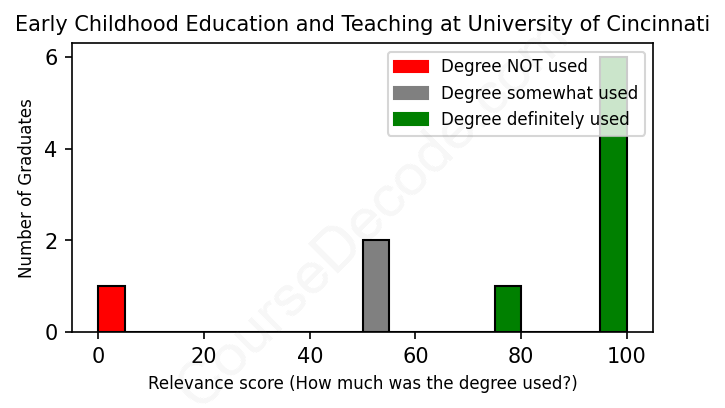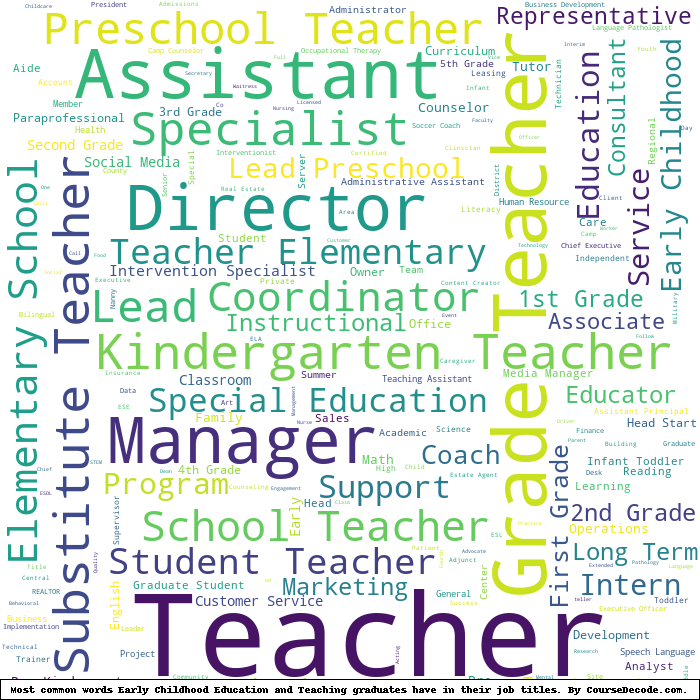
First, some facts. Of the Early Childhood Education and Teaching graduates from University of Cincinnati we've analyzed , here's how many have used (or NOT used) their degree in their career:

These are estimates based on AI analysis of 10 LinkedIn profiles (see below).
The verdict? Above average. Overall, with an average relevance score of 77%, Early Childhood Education and Teaching graduates from University of Cincinnati have a higher likelihood (+10%) of finding work in this field compared to the average graduate across all fields:
And for comparison, here's the chart for all profiles we've looked at across all degrees.
Also, after graduating, only 30% of these graduates have pursued further education other than another Bachelor's degree (such as a Masters degree or other), compared to the average across all profiles of 35%. This suggests a Bachelors degree is enough for most Early Childhood Education and Teaching graduates, and it's normal to look for work straight after graduation.
See the details:
|
Relevance score: 76% We think this person has gone into a career highly relevant to their degree. We think this person has gone into a career highly relevant to their degree.
DEGREE INFOGraduated in 2013 from University of Cincinnati with a Bachelor of Science - BS in Early Childhood Education and Teaching. No other secondary education since. JOB HISTORY SINCE GRADUATIONPre Kindergarten Teacher Prodigy Early Education Aug 2013 - Aug 2014 Kindergarten Teacher  Prodigy Early Education Aug 2014 - Aug 2015 Director  Prodigy Early Education Aug 2015 - Jul 2017 Director of Curriculum  Prodigy Early Education Jul 2017 - Sep 2018 Kindergarten Teacher  Lakota Local Schools Aug 2021 - Jul 2022 Curriculum Developer  Wandering Education Jul 2020 - Aug 2023 OTP Compliance Coordinator  BrightView Nov 2023 - Present ABOUTEnthusiastic and dedicated professional dedicated to assisting teachers and students in reaching their full potential. Looking to use my experience and knowledge to work cooperatively with educators that are passionate about providing experiences for students centered on best practices and life-long learning. Motivated to create and maintain a culture of collaboration, trust, respect and dedication to student achievement. |
The top 10 most common jobs done by the graduates we've analyzed (ranked most common to least) are:
From analyzing the LinkedIn profiles of graduates from the University of Cincinnati with a degree in Early Childhood Education and Teaching, it’s clear that many have pursued careers closely related to their field of study. The most common positions include roles such as Lead Teacher, Kindergarten Teacher, Title I Teacher, and various administrative and educational coordinator positions. These jobs utilize skills directly tied to early childhood education, such as developing curricula, teaching young children, and supporting educational needs in school settings. For example, roles like the Lead Teacher at Cincinnati Public Schools and the Kindergarten Teacher at Lakota Local Schools are prime examples where individuals are applying their knowledge of child development every day in the classroom.
However, it’s worth noting that not all career paths of these graduates align with early childhood education. Some have ventured into jobs that don’t use their educational skills at all, like Licensed Insurance Agents or interior stylists. While these positions may draw on some transferable skills—like communication or organization—they lack the core responsibilities associated with teaching children or fostering their educational development. Overall, while many graduates enjoy fulfilling careers in early childhood education, there’s a noticeable split between those who remain directly within the field and those who choose divergent paths. Generally speaking, the majority seem to be relevantly positioned, contributing to the education sector in meaningful ways.
Here is a visual representation of the most common words in job titles for Early Childhood Education and Teaching graduates (this is across all Early Childhood Education and Teaching graduates we've analyzed, not just those who went to University of Cincinnati):

When looking at the career paths of graduates with a degree in Early Childhood Education and Teaching from the University of Cincinnati, it’s evident that many have started out in traditional educational roles right after graduation. A common first job is teaching in various capacities, such as being a kindergarten or first-grade teacher, which aligns well with their degree. For instance, several graduates have taken positions as preschool or kindergarten teachers, and others have ventured into roles like Lead Teacher in public school systems. This initial move into teaching directly reflects their educational background, showing that they're likely to find rewarding careers in the field of early childhood education.
As time goes on—after five or ten years—some graduates continue climbing the educational ladder, securing positions such as curriculum developers, educational coordinators, or even moving into administrative roles. Meanwhile, others have shifted away from direct teaching to explore different fields, like education coordination at institutions or operational roles in unrelated businesses, which may not directly utilize their teaching background. Overall, many have maintained relevance to their Early Childhood Education degrees, while a few have diverged into different career paths. It looks like most graduates are making good use of their education in early childhood settings even several years down the road, which is promising for anyone considering this field. However, it also highlights the importance of being adaptable, as career journeys can take unexpected turns.
Honestly, a Bachelor’s degree in Early Childhood Education and Teaching can be a mix of fun and challenging, but it’s generally considered to be on the easier side compared to some other degrees. You’ll get to learn about child development, creativity in teaching, and how to engage young learners, which is pretty interesting stuff—plus, there’s often hands-on experience through internships or practicums. While there are assignments and coursework, the focus on practical application can make it feel more manageable. If you’re passionate about working with young children and enjoy creative activities, you might find it comes more naturally to you than other more technical fields. So, if you’re all about nurturing little minds, this degree might just be a good fit!
Most commonly, in the LinkedIn profiles we've looked at, it takes people 4 years to finish a Bachelor degree in Early Childhood Education and Teaching.
Alright, so if we're looking at these graduates from the University of Cincinnati in Early Childhood Education, it seems like they’ve mostly stuck to teaching jobs, which typically don’t pay super high salaries, especially compared to other fields. People like the first grad have had a mix of educational roles, probably earning a decent living, especially with some coordinator positions, but others, like the lead teacher in Cincinnati Public Schools, might be scraping by a bit more. Most of them seem to be doing fine, but they’re definitely on the lower end of the pay scale compared to those in corporate or specialized roles. Overall, it's not terrible, but they might not be rolling in it—more of a comfortable vibe rather than a flashy lifestyle.
Here is a visual representation of the most common words seen in the "about" section of LinkedIn profiles who have a Bachelor degree in Early Childhood Education and Teaching (this is across all Early Childhood Education and Teaching graduates we've analyzed, not just those who went to University of Cincinnati). This may or may not be useful:

Here are all colleges offering a Bachelor degree in Early Childhood Education and Teaching (ordered by the average relevance score of their Early Childhood Education and Teaching graduates, best to worst) where we have analyzed at least 10 of their graduates:
| College | Score | Count |
|---|---|---|
 Kennesaw State University Kennesaw State University
|
86 | 10 |
 The University of Georgia The University of Georgia
|
81 | 12 |
 Miami University Miami University
|
78 | 16 |
 University of Cincinnati University of Cincinnati
|
77 | 10 |
 Kent State University Kent State University
|
75 | 13 |
 Ashford University Ashford University
|
59 | 39 |